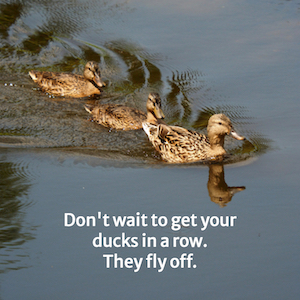
A child stands at the end of a dock on a summer afternoon, gazing into the lake. She wants to jump in and swim, but spends a long time preparing herself.
She sits on the edge of the dock and dangles her feet in the top inches of the lake water. It feels icy on her warm toes. She stands up and steps into an inflatable swim ring, so she’ll bob up and keep her head dry when she jumps in.
The water looks both inviting and scary.
She grabs the ladder at the end of the dock and lowers herself on to the top rung. If she waits long enough, even her ankles get accustomed to the cold. But that next step … that one will be hard.
Back up the ladder, she puts her towel on the dock where it will be right at hand when she gets out after the swim.
Her family, already in the lake, shouts encouragement. “Jump in! It’s fine once you start swimming.”
That’s how I feel sometimes when chatting with people who are planning their writing projects. Like the reluctant swimmer, they linger on the dock rather than diving in. They gather tools they might need. They test the waters.
Planning and preparation are convenient disguises for Resistance.
Recognizing Resistance
In The War of Art, Steven Pressfield describes Resistance (with a capital R) as a powerful force that keeps us from taking risks. He writes:
“Resistance cannot be seen, touched, heard, or smelled. But it can be felt. We experience it as an energy field radiating from a work-in-potential. It’s a repelling force. It’s negative. Its aim is to shove us away, distract us, prevent us from doing our work.”
Stephen Pressfield
Resistance is most powerful when it operates in the shadows—when you sense its inhibiting presence rather than examining it directly. To avoid being seen, Resistance often hides behind other socially-acceptable behaviors.
Here are a few of the forms that resistance takes for the writers that I speak with:
Planning and preparation
Resistance often looks like planning and preparing. It sounds like this:
I need to research tools for managing my notes and writing before I start the book. Should I take a class on Scrivener?
In the summer, I should have a several uninterrupted weeks to write, so I’ll wait for that.
On the surface, these statements appear reasonable. But the perfect time to write never really happens.
If you wait to get all your ducks in a row, they may migrate south.

You won’t really know what tools you need on a writing project until you’re in it. Write using whatever tool you know and like today.
If you discover you need more structure, by all means, find another tool. But you cannot evaluate a writing platform like Scrivener fairly until you have a project ready to work with. Even then, you have to be in the middle of it to really learn.
You don’t know what you need until you’re swimming in the writing.
Waiting for the original idea
When I come up with an original idea, I’ll start writing.
Someone already wrote the definitive book on my subject. No publisher will want mine.
Originality is overrated. If you invest deep thought and research in your work, the result will be uniquely yours, even if other people have covered the same territory.
You probably have a unique approach or perspective. You may not discover it until you’re working on your project.
If you’re waiting for that original idea, ask yourself why originality is so important.
Isn’t there room for more than one book, blog post, video, or podcast on a topic?
(I certainly hope so, because an army of excellent authors write about writing.)
Will someone find value in your perspective on this topic? And if so, would you withhold it back them out of some internal commitment to originality?
Here’s an idea—write about those other works that inspire you. Share them with others, while offering your unique lens
Jump in
Remember the girl on the dock? That was me on family vacations. I loved swimming. Yet every single time, I dithered on the dock, negotiating with Resistance. In doing so, I lost valuable time in the lake.
Jump into your writing project. As you work, you’ll figure out what you want from tools. Your unique angle will come into focus. You’ll learn how to get the help you need.
You’ll figure it out.

Related writing
Related post: Writing, Courage, and Community
For inspiration on writing a book, see Get the Word Out: Write a Book That Makes a Difference.